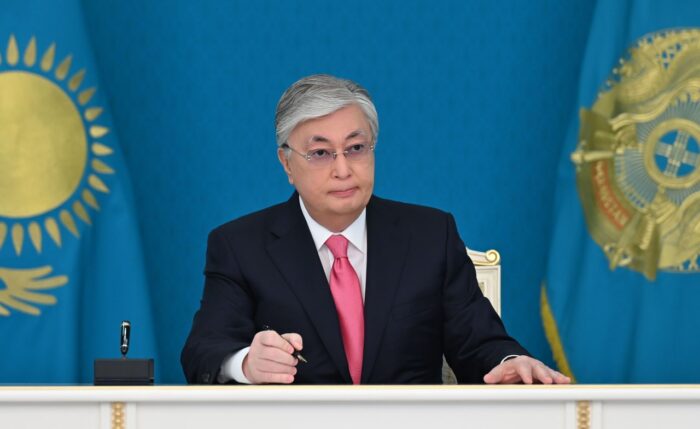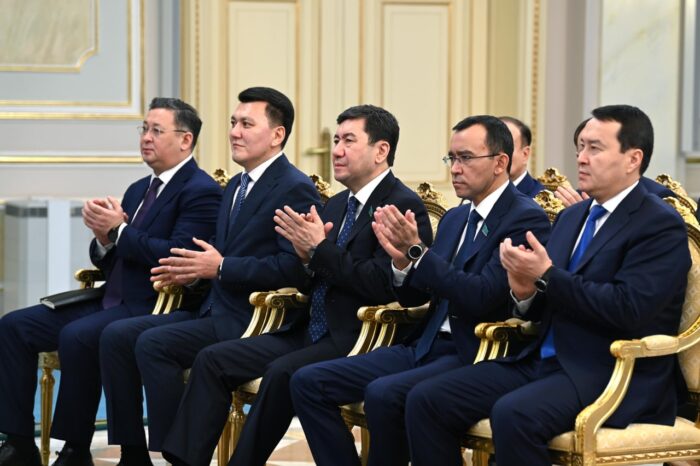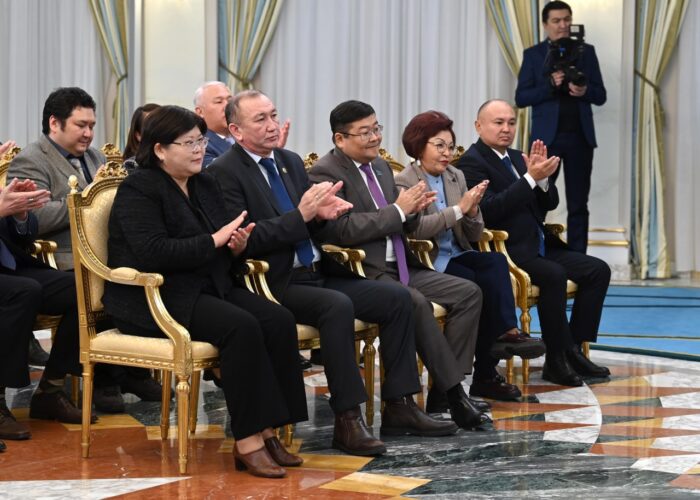ASTANA – President Kassym-Jomart Tokayev signed into law the constitutional amendments to re-establish the Constitutional Court and expand the powers of the country’s Human Rights Commissioner and the human rights focus of the Prosecutor General, among other laws, at a public ceremony on Nov. 5 at Akorda, reported the presidential press service.

The laws are aimed at increasing the human rights focus of the state policy. Photo credit: Akorda.kz
The six laws that Tokayev signed during the ceremony were adopted following the June 5 national referendum on amendments to the Constitution and marked the “beginning of a constitutional reform”. They are meant to introduce the initiatives he voiced in his March 16 state-of-the-nation address.
“The constitutional reform marked the beginning of a new era in the history of Kazakhstan. It allowed consolidating the political transformation of the last three years and laying a solid foundation for strengthening our statehood. From now on, the principles of justice, transparency and solidarity will be strictly observed. The referendum convincingly showed that we can withstand unprecedented external and internal challenges,” said Tokayev.

The signing of the laws is rarely held in the format of a public ceremony. Photo credit: Akorda.kz
Based on the amendments, the Constitutional Court will start functioning from Jan. 1, 2023. The Constitutional Court will consist of 11 judges. Six judges are appointed by the Parliament (three judges each by the Mazhilis and the Senate), and four judges are appointed by the President. The Chairperson of the Constitutional Court is appointed by the President with the consent of the Senate.
The human rights commissioner has also been granted immunity from prosecution, has become independent and not accountable to any state bodies and officials, and has the right to apply directly to the Constitutional Court, the same right that the country’s citizens will also acquire.
The human rights function of the Prosecutor General has also been strengthened, as the Prosecutor General now has the right to apply to the Constitutional Court to review any of the country’s legal acts to ensure their compliance with the Constitution, including laws.
Transition to a mixed electoral system
The laws also regulate Kazakhstan’s transition to a mixed electoral system, according to a system of proportional representation in the territory of a single nationwide constituency, as well as in single-mandate territorial constituencies.

Besides state officials, the public ceremomy also gathered experts and public figures, who took part in the writing of the amendments. Photo credit: Akorda.kz
Some deputies of the Mazhilis, a lower chamber of the Kazakh Parliament, and the regional maslikhats (local representative bodies), and deputies of district maslikhats will be elected in single-member districts.
“From now on, the electoral process will be based on a mixed electoral system. The changes will affect the election of deputies to the Mazhilis and maslikhats of regions, cities of national significance and the capital. Half of the deputies will be elected under the system of proportional representation in a single territorial constituency. The other half of the deputies will be elected in single-member territorial constituencies. In turn, deputies of maslikhats of districts and cities of regional importance will be elected only in single-mandate territorial constituencies,” said Yermek Toktarov, head of the political research department at the Kazakh Institute of Strategic Studies.
Kazakhstan will have elections to the Mazhilis and maslikhats in the first half of the next year, which, according to Tokayev, will be held according to “new, more fair and open rules.”
People are at the center of state policies
Tokayev reiterated that the people will continue to be a priority for the state and that the idea of justice will become the basis of the state policy.
“Our Constitution proclaims that the land and its subsoil, water, flora and fauna and other natural resources belong to the people. Thanks to the adoption of this norm, a large-scale National Fund for Children program will be launched. The true greatness of a nation is the well-being of each family and each citizen, which is why the national economy should work for the benefit of the people,” said the President.
Continued political transformation
Since 2019, Kazakhstan has implemented four packages of political reforms, within which 13 laws were adopted to increase competitiveness and transparency of the political process, according to State Counselor Erlan Karin.
“It is clear that the constitutional reform required amendments and additions to the current legislation. The government drafted relevant laws reflecting the constitutional amendments and submitted them to the Parliament in September. These laws were first thoroughly and comprehensively reviewed and approved by the Mazhilis, then adopted by the Senate and today publicly signed by the President,” wrote Karin on his Telegram channel.
The adoption of six laws, he noted, will lead to a redistribution of presidential power to other institutions, reformatting the representative branch of power, improving the electoral system, enhancing human rights institutions and modernizing the electoral process.

